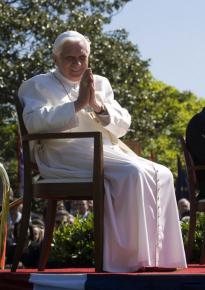The Catholic Church’s web of deceit
looks at the latest revelations about the role of Pope Benedict in the covering up the sexual and physical abuse of children within the Catholic Church.
RECENTLY, THE Associated Press news agency published a number of documents dealing with the efforts of a California bishop to persuade Cardinal Ratzinger, as he was then, to allow the laicization of a priest who had been convicted of abusing children.
The cardinal wouldn't hear tell of it.
The Kiesle case did not involve a bishop hushing up child abuse allegations and failing to alert the civil authorities. Far from it. Oakland bishop Dr. John Cummins appears to have behaved with propriety, only to be thwarted by the man who was to become Pope.
Father Steven Kiesle had been convicted and given three years probation in 1978 for tying up and molesting two boys in a church rectory in San Francisco. In 1981, his probation completed, Kiesle asked the diocese to allow him to leave the priesthood. Dr. Cummins wrote to Cardinal Ratzinger, then about to take over as Prefect of the Congregation for the Doctrine of the Faith, seeking permission to take Kiesle at his word.
Ratzinger appears to have ignored the letter. Over the next two years, the Oakland diocese wrote to Ratzinger on at least three occasions, asking what progress had been made. No information was forthcoming apart from a letter from a Vatican official suggesting that the Kiesle file may be lost.

Dr. Cummins wrote again to Cardinal Ratzinger: "It is my conviction that there would be no scandal if this petition were granted and that, given the nature of the case, there might be a greater scandal to the community if Father Kiesle were allowed to return to the active ministry."
Ratzinger didn't reply. It was not until 1985--four years after the bishop first requested to sanction the priest's removal--that he finally wrote back. The case was of "grave significance", he conceded, but "it is necessary for this congregation to submit incidents of this sort to very careful consideration, which necessitates a longer period of time."
Attention had to be paid to the "good of the universal Church." The bishop should be mindful of "the detriment that granting the dispensation can provoke within the community of Christ's faithful." In the meantime, Kiesle should be given "as much paternal care as possible."
KIESLE WAS finally unfrocked in 1987. In 2002, he was arrested and charged with 13 counts of child abuse dating back to his time as a priest.
In 2004, he was sentenced to six years in prison for sexually abusing a young girl. An attorney who interviewed him in prison told the New York Daily News: "He admitted molesting many children, bragged that he was the Pied Piper and said he had tried to molest every child who sat in his lap."
In 2001, Cardinal Ratzinger issued an updated version of the 1962 Vatican document Crimen Sollicitationis ("The Crime of Solicitation"), laying down that allegations of clerical sex offenses should be kept confidential and forwarded to his office in Rome. As the National Catholic Reporter in the U.S. suggested, "As a result, [Ratzinger] acquired a familiarity with the contours of the problem that virtually no other figure in the Catholic Church can claim."
However, when Cardinal Ratzinger was asked at a conference in Spain in November 2002 to respond to the spate of sex abuse allegations in the U.S., he commented: "The constant presence of these news items does not correspond to the objectivity of the information...therefore, one comes to the conclusion that it is intentional, manipulated; that there is a desire to discredit the Church."
In the Irish Republic three years later, retired Supreme Court judge Frank Murphy published a 271-page report detailing more than 100 allegations of child sex abuse against 26 priests over a period of 40 years in the diocese of Ferns.
The following year, after a meeting with new Ferns bishop Denis Brennan, Benedict expressed his "personal anguish and horror" at the revelations. He made no reference to Judge Murphy's finding that in betraying the victims and protecting the abusers, the diocese had been doing no more than following instructions from Rome.
Last month, in a pastoral letter reflecting on the report from Judge Yvonne Murphy on clerical abuse and cover-up in the Dublin archdiocese, Benedict professed himself "deeply disturbed by the information which has come to light." The Irish bishops had made "grave errors of judgment...and failures of leadership occurred." There was no mention of the possibility that the bishops might have been following Benedict's own wishes.
As new allegations continue to emerge, it becomes clear that the pattern of evasion, obstruction and cover-up reflects the instructions of the Vatican, and specifically of the Pope. The case against Benedict for collusion in child sex-abuse is much stronger than the case against a number of Irish bishops who have been forced to resign.
First published in the Belfast Telegraph.


